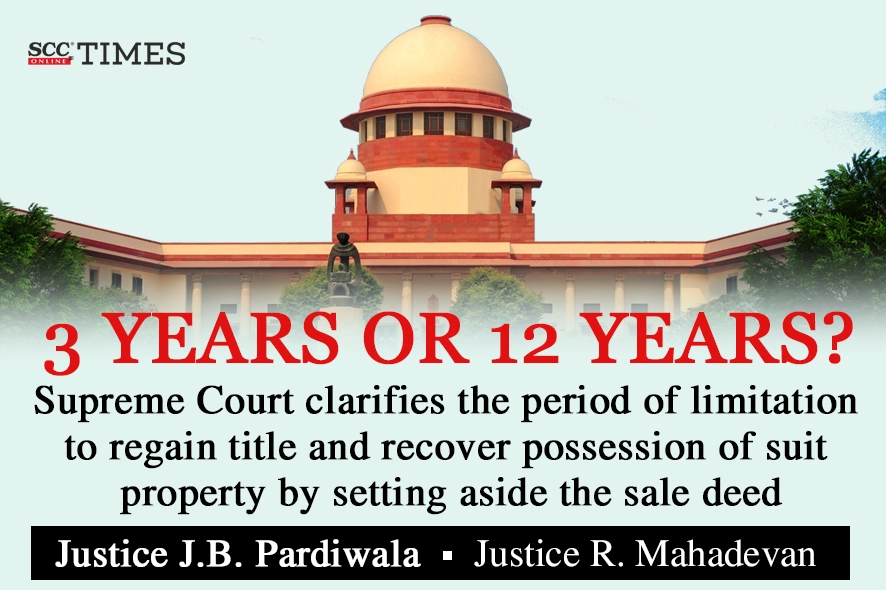Supreme Court: In a civil appeal against a decision of the Karnataka High Court whereby the appellants’ second appeal was dismissed and the judgment passed by the First Appellate Court allowing the respondents’ appeal, decreeing the suit for declaration of title and possession was affirmed, the Division Bench of JB Pardiwala* and R. Mahadevan, JJ. dismissed the appeal, upholding the High Court’s decision. The Court held that the period of limitation to regain title over the suit property and recover the possession by setting aside the sale deed is three years and not twelve.
Background
The original plaintiff instituted a suit seeking relief of declaration and injunction in respect of the suit property. The Trial Court dismissed the suit, however, opined that the original plaintiff was the absolute owner and in possession of the suit property. The Trial Court held that the original defendants/ appellants herein were not interfering with the peaceful possession and enjoyment of the suit properties. Since, the original plaintiff passed away, the legal heirs/ respondents herein, preferred first appeal challenging the judgment and decree passed by the Trial Court. The original defendants had also preferred an appeal against the Trial Court’s decision for opining that the original plaintiff was the absolute owner.
The First Appellate Court allowed the legal heirs appeal and held that they belong original plaintiff’s family and thereby absolute owners of the suit property by virtue of inheritance. Hence, the Trial Court’s decision was reversed by the First Appellate Court.
The original defendants approached the High Court under Section 100 of the Code of Civil Procedure, 1908 (‘CPC’). The High Court found that there was no substantial question of law involved and accordingly dismissed the same the second appeal. Hence, the present appeal.
Issue
Whether the suit for possession (before the First Appellate Court) filed by the legal heirs of the original plaintiff/ defendants herein was within the period of limitation?
Analysis and Decision
The Court said that as far as title of the property was concerned, the original plaintiff was able to establish that she was the absolute owner of the suit properties.
Perusing Section 3(1) of the Limitation Act, 1963, the Court said that it prescribes that if any suit, appeal, or application is filed beyond the prescribed period of limitation, the same is liable to be dismissed even though the plea of limitation has not been taken as a defence. Perusing Section 27 of the Limitation Act, which provides for- Extinguishment of right to property. –At the determination of the period hereby limited to any person for instituting a suit for possession of any property, his right to such property shall be extinguished, the Court said that as far as a suit for possession is concerned, the same should be filed before expiry of the period mentioned in the Limitation Act. If the same is filed beyond the period of limitation, the right of the plaintiff over such property shall be extinguished. The Court also noted that Article 58 of the Limitation Act clarifies that apart from the declaratory suits mentioned in Articles 56 and 57, any other declaratory suit should be filed within three years from the date when right to sue first accrues.
Further, the Court noted that Article 65 stipulates that a suit filed for recovery of possession based on title should be filed within a period of 12 years when possession of the defendant becomes adverse to the plaintiff concerned.
To answer whether the reliefs sought in the present suit would come within the contour of Article 58 or any other Article of the Limitation Act, the Court noted that the chronology of the events: the first appeal was filed on 30-10-2014; and application seeking amendment of the plaint was filed along with the first appeal on 30-10-2014.
The Court noting that the plaint was amended at the stage of the first appeal, said that a party cannot be refused relief merely because of some mistake, negligence, inadvertence or even infraction of rules of procedure. The Court reiterated that relief is given to amend the pleading of the party unless it is satisfied that the party applying was acting mala fide or that by his blunder, he had caused injury to his opponent which cannot be compensated for by an order of cost. The Court also reiterated that the Court should decline amendments if a fresh suit on the amendment claims would be barred by limitation on the date of application.
Dismissing the appellant’s submission, as not being sustainable in law as it proceeds on the assumption as if old Article 142 of the Limitation Act, 1908 was in force wherein the plaintiff who based his case on the title had to prove not only title but also possession within twelve years of the date of the suit, the Court said that it is well settled that when there are several reliefs claimed in a suit, the limitation period would be that of the main relief, the limitation for ancillary relief being ignored.
Therefore, the Court said that when the suit is based on the title for possession, once the title is established based on relevant documents and other evidence unless the defendant proves adverse possession for the prescriptive period, the plaintiff cannot be non-suited. The Court went on to explain that ordinarily when a suit for cancellation of Sale Deed and recovery of possession is filed, the same would suggest that the title of the plaintiff has already been lost. By seeking to get the Sale Deed set aside on the grounds as may have been urged in the plaint, the plaintiff could be said to be trying to regain his title over the suit property and recover the possession. In such circumstances, the period of limitation would be three years and not twelve years.
CASE DETAILS
|
Citation: Appellants : Respondents : |
Advocates who appeared in this case For Petitioner(s): For Respondent(s): |
CORAM :









Can I get the case number and date for verification?
Citation is provided at the end of the brief.